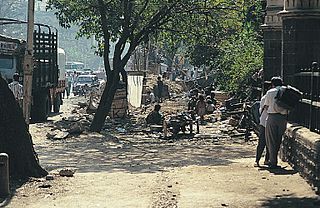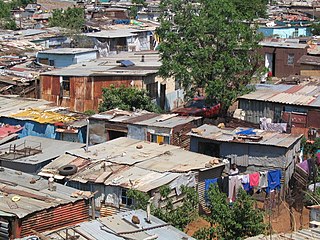Related Research Articles

A slum is a highly populated urban residential area consisting of densely packed housing units of weak build quality and often associated with poverty. The infrastructure in slums is often deteriorated or incomplete, and they are primarily inhabited by impoverished people. Although slums are usually located in urban areas, in some countries they can be located in suburban areas where housing quality is low and living conditions are poor. While slums differ in size and other characteristics, most lack reliable sanitation services, supply of clean water, reliable electricity, law enforcement, and other basic services. Slum residences vary from shanty houses to professionally built dwellings which, because of poor-quality construction or lack of basic maintenance, have deteriorated.

Dharavi is a residential area in Mumbai, Maharashtra, India. It is considered India's largest slum and the world's third largest slum, after Pakistan's Orangi, Karachi and Mexico's Ciudad Neza, Mexico City. With a population of about 600,000 and a population density of over 277,136/km2 (717,780/sq mi), Dharavi is one of the most densely populated areas in the world.
Ruth Manorama is a Dalit social activist from Bangalore, India who fights for Dalit women's rights, the rights of domestic workers and those in the unorganized labour sector, as well as urban slum dwellers. In 2006, she was awarded the Right Livelihood Award.
Slum upgrading is an integrated approach that aims to turn around downward trends in an area. These downward trends can be legal, physical (infrastructure), social or economic." The main objective of slum upgrading is to rehabilitate them into functional neighborhoods by addressing the social needs of the community, and improving integration into the formal urban economy.
Slum/Shack Dwellers International (SDI), is a global social movement of the urban poor that started in 1996. It forms a network of community-based organisations in more than 30 countries across Africa, Asia, Latin America and the Caribbean.
The National Slum Dwellers Federation (NSDF) in India was established by Jockin Arputham when he fought on behalf of a community of 70,000 to appeal a 1976 eviction order. It is a national organization which brings together multiple communities and their leaders who live in slum settlements around India. NSDF along with Mahila Milan are one of the oldest members of the Urban Poor Fund International Network. Due to the efforts of NSDF, around 90 buildings and 300 toilet blocks have been constructed in Mumbai, providing houses and sanitation to over 35,000 families. Additionally, around 100 toilet blocks have been constructed in Pune.
Mahila Milan is a self-organised, decentralised collective of female pavement dwellers in Bombay. The group works with issues such as housing, sanitation, and grassroots lending schemes. It aims at gaining women equal recognition for improvement of their communities, while indulging in important decision making activities. The loans granted by the group to its members in times of need, are sanctioned in the name of the woman of the house.

Pavement dwellers refers to informal housing built on the footpaths/pavements of city streets. The structures use the walls or fences which separate properties from the pavement and street outside. Materials include cloth, corrugated iron, cardboard, wood, plastic, and sometimes also bricks or cement.

Sheela Patel is an activist and academic involved with people living in slums and shanty towns.
The Slum Rehabilitation Act 1995 was passed by the government of the Indian state Maharashtra to protect the rights of swamp dwellers and promote the development of swamp areas. The Act protected from eviction, anyone who could produce a document proving they lived in the city of Mumbai before January 1995, regardless if they lived on the swamp or other kinds of marsh land. The ACT was the result of policy development that included grassroots slum dweller organisations, particularly SPARC.
We, the Invisible was a report based on a 1985 census of around 6,000 pavement dweller families, funded and carried out by the Society for the Promotion of Area Resource Centers (SPARC) and the Society for Participatory Research in India (PRIA). It drew attention to this disadvantaged group and helped to reduce the number of violent evictions.

The KwaZulu-Natal Elimination and Prevention of Re-emergence of Slums Act, 2007 was a provincial law dealing with land tenure and evictions in the province of KwaZulu-Natal in South Africa.

Illegal housing in India consists of huts or shanties built on land not owned by the residents and illegal buildings constructed on land not owned by the builders or developers. Although illegal buildings may afford some basic services, such as electricity, in general, illegal housing does not provide services that afford for healthy, safe environments.
Anita Reddy is an Indian social worker from Karnataka and the founder of Association for Voluntary Action and Services (AVAS), known for her services for the rehabilitation and upliftment of the slum dwellers in Karnataka and Andhra Pradesh. She is the managing trustee of DWARAKA and DRIK Foundations, working for children's education and women's livelihoods. The Government of India honored Anita Reddy in 2011, with the fourth highest civilian award of Padma Shri.

Cities Alliance is a global partnership fighting urban poverty and supporting cities to deliver sustainable development. To manage its activities, the Cities Alliance operates a multi-donor fund with UN Office for Project Services (UNOPS), as host and trustee. Different members provide direction, financing and advocacy. Cities Alliance aims to deliver solutions to urban poverty.
Cheeta Camp is a low lying area near Trombay, Mumbai, Maharashtra. It is a part of Municipal M-East Ward and located along the Arabian Seafront.

Informal housing or informal settlement can include any form of housing, shelter, or settlement which is illegal, falls outside of government control or regulation, or is not afforded protection by the state. As such, the informal housing industry is part of the informal sector.
Slum clearance in India is used as an urban renewal approach to redevelop and transform poor and low income settlements into new developments or housing. Millions of people live in slum dwellings across India and many migrate to live in the slums from rural villages, often in search of work opportunities. Houses are typically built by the slum dwellers themselves and violence has been known to occur when developers attempt to clear the land of slum dwellings.

Shadow Cities: A Billion Squatters, A New Urban World is a 2004 book by Robert Neuwirth. He wrote it after visiting informal settlements such as Dharavi, Kibera and Rocinha.
References
- 1 2 3 Parekh, Anuradha (14 October 2014). "10 Things You Need To Know About The Other Indian Who Was Nominated For The Nobel Peace Prize, 2014". The Better India. Retrieved 9 May 2019.
- 1 2 "Padma Awards" (PDF). Ministry of Home Affairs, Government of India. 2015. Archived from the original (PDF) on 15 October 2015. Retrieved 21 July 2015.
- 1 2 3 UN-Habitat's Executive Director. "Demise of Jockin Arputham (15 August 1947 – October 13 2018)". UN Habitat. Retrieved 9 May 2019.
- 1 2 3 4 Perur, Srinath (12 June 2014). "Jockin Arputham: from slum dweller to Nobel Peace Prize nominee". The Guardian. Retrieved 16 July 2019.
- 1 2 3 Arputham, Jockin (2008). "Developing new approaches for people-centred development". Environment and Urbanization. 20 (2): 319–337. Bibcode:2008EnUrb..20..319A. doi: 10.1177/0956247808096115 .
- 1 2 Satterthwaite, David (8 April 2014). "From slum-dwelling carpenter to US$1.25 million prize winner". International Institute for Environment and Development. Retrieved 9 May 2019.
- 1 2 3 Matters India Reporter (15 October 2018). "Champion of slum-dwellers' rights dies". Matters India. Retrieved 9 May 2019.
- ↑ Roy, A.N.; Jockin, A.; Javed, Ahmad (2004). "Community police stations in Mumbai's slums". Environment & Urbanization. 16 (2): 135–138. Bibcode:2004EnUrb..16..135R. doi: 10.1177/095624780401600205 .
- ↑ Echanove, Matias; Srivastava, Rahul. "Long live the 'Slum King'". The Hindu. Retrieved 9 May 2019.